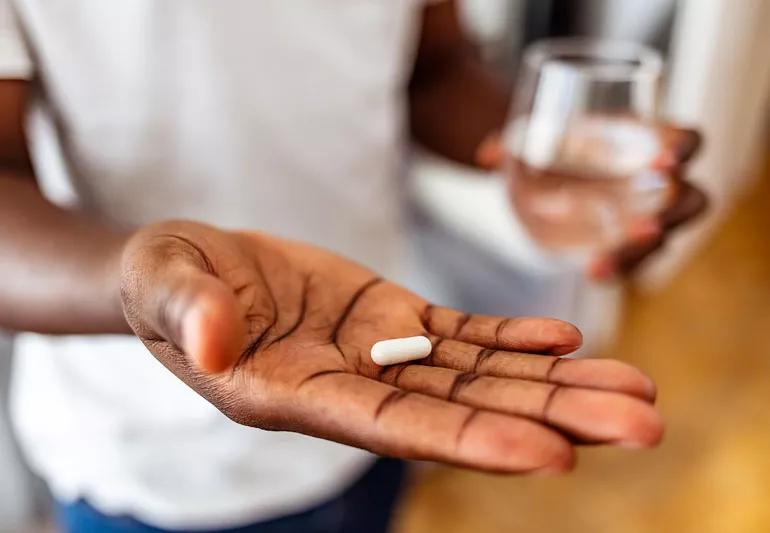Sync your supplements with your schedule for maximum benefits

Image content: This image is available to view online.
View image online (https://assets.clevelandclinic.org/transform/711b4313-26a2-47e1-b2d3-f7a4b2d1d0c0/takingVitaminsBestTimes-1286862342-770x533-1_jpg)
Taking vitamins with water
Taking vitamins can be a great way to support your nutritional needs — but there is a right way to do it.
Advertisement
Cleveland Clinic is a non-profit academic medical center. Advertising on our site helps support our mission. We do not endorse non-Cleveland Clinic products or services. Policy
“When people don’t take vitamins the proper way, they don’t see improvement,” says family medicine doctor Rodolfo Perez-Gallardo, MD. “Your body can’t fully absorb vitamins unless you know the best time to take them.”
Dr. Perez-Gallardo says it’s less about time of day and more about syncing the habit with your eating and drinking schedule. He explains how.
Vitamin C and vitamin B12 are water-soluble vitamins, which means you need water to absorb them. “Take water-soluble vitamins on an empty stomach with a glass of water,” recommends Dr. Perez-Gallardo.
And since it can be energizing, Dr. Perez-Gallardo says that the best time to take vitamin B12 is in the morning, so it won’t affect your sleep.
Fat-soluble vitamins require fat for your body to absorb them. They include:
For maximum absorption, the best time to take vitamin D and other fat-soluble vitamins is after you’ve eaten foods that contain fat. And you don’t need much: Dr. Perez-Gallardo says even small amounts of low- or whole-fat milk or yogurt will do the trick. So will eating food cooked with oil.
Multivitamins can be trickier: They often contain both water- and fat-soluble vitamins. “The best time to take a multivitamin is with food so any fat can help with absorption. You can also drink a water-based beverage to wash it all down,” notes Dr. Perez-Gallardo. “But the drawback is that your body won’t absorb the water-soluble vitamins as well as fat-soluble ones.”
Advertisement
The reverse is true when you take a multivitamin on an empty stomach with water — your body can’t properly absorb the fat-soluble vitamins. You could also end up with an upset stomach. So for full absorption, Dr. Perez-Gallardo recommends taking water- and fat-soluble vitamins separately.
While they are important throughout pregnancy, the best time to start taking prenatal vitamins is before you’re pregnant — when you’re planning to conceive, says Dr. Perez-Gallardo.
And while you’re at it, also take 400 micrograms of folic acid daily three months before you plan to get pregnant. “Folic acid is essential for the development of your baby’s neural tube. Not having enough can lead to neural tube defects,” he says.
Many people consider calcium to be a vitamin, but it’s actually a mineral. So, you’ll want to be careful and not overdo it with calcium. Most people can get a sufficient amount of it from food. But if you’re not eating enough calcium-rich foods or you’re postmenopausal, Dr. Perez-Gallardo says you’ll need to take calcium the right way to decrease bone loss and osteoporosis.
Calcium supplements come in two forms: calcium carbonate and calcium citrate. The best time to take calcium depends on the kind you take, explains Dr. Perez-Gallardo.
Before you start a daily vitamin habit, Dr. Perez-Gallardo emphasizes that not everyone needs them. “If you eat a nutritious, balanced diet, you do not need these supplements. The best source of vitamins and minerals is a plate that is one-quarter fruits, one-quarter vegetables, one-quarter protein, such as fish and poultry, and the other quarter grains.”
If you can’t eat this way at least one meal a day, you may benefit from taking vitamins. Doctors may also recommend taking vitamins if you:
Advertisement
“But talk to your healthcare provider first,” says Dr. Perez-Gallardo. “Your provider can check your levels to see if and where you are deficient, then get you what you need.”
Advertisement

Delivered every Tuesday!
Sign up for our Health Essentials emails for expert guidance on nutrition, fitness, sleep, skin care and more
It's a letter about the news!
Learn more about our editorial process.
Advertisement
There are several vitamins and mineral supplements that many people can benefit from — but it’s important to consult with a healthcare provider before you start one
These essential elements from fats, protein, carbs, vitamins and minerals help your body function properly
Experts are at odds over the effectiveness of multivitamins
Be sure to tell your doc about over-the-counter pills and powders
Do’s and don’ts for supplementing without a stomach ache
Ground flaxseed is full of heart-healthy omega-3s, antioxidants and fiber, and easy to add to just about any recipe
B vitamins do a lot for your body, like activate enzymes that give you energy, create blood cells and prevent DNA damage
This is to test the PBI 79194
Type 2 diabetes isn’t inevitable with these dietary changes
Applying a hot or cold compress can help with pain
Pump up your iron intake with foods like tuna, tofu and turkey